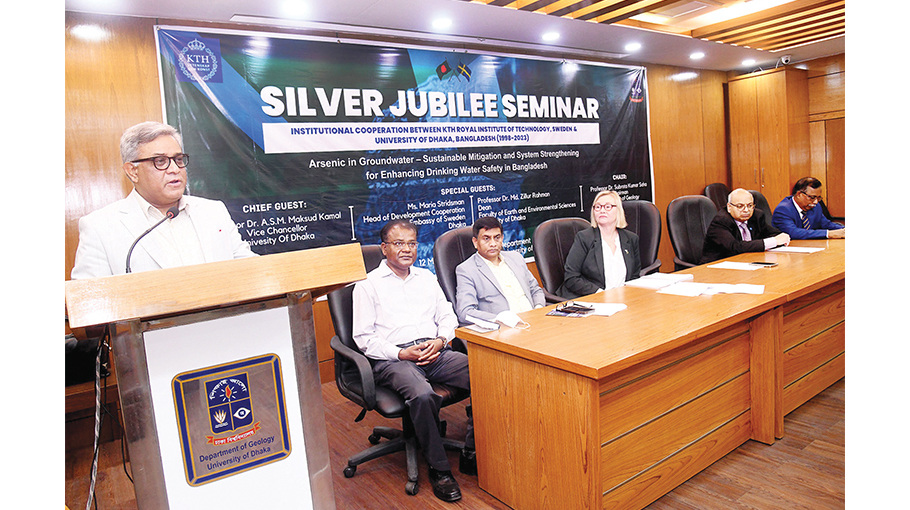DU, KTH team up to combat arsenic

In commemoration of twenty-five years of fruitful cooperation between Dhaka University (DU) and the KTH Royal Institute of Sweden, a seminar addressing the pressing issue of arsenic contamination in groundwater was held at the DU Department of Geology auditorium. Titled "Arsenic in Groundwater--Sustainable Mitigation and System Strengthening for Enhancing Drinking Water Safety in Bangladesh," the seminar aimed to shed light on effective mitigation strategies and system enhancement measures.
The seminar, inaugurated by Dhaka University Vice-Chancellor Professor Dr. ASM Maksud Kamal, featured esteemed speakers including Departmental Chairman Prof. Dr. Subrata Kumar Saha, Dean of the Faculty of Earth and Environmental Sciences Prof. Dr. Md. Zillur Rahman, and Miss. Maria Streidshman, Head of Development Cooperation at the Swedish Embassy in Dhaka. Highlighting the significance of collaborative efforts, speakers emphasized the critical importance of addressing arsenic pollution to ensure clean and safe drinking water for the populace.
Professor Dr. ASM Maqsood Kamal underscored the gravity of arsenic pollution as a natural disaster and commended the government's proactive stance in implementing projects to combat this issue, particularly mentioning Prime Minister Sheikh Hasina's leadership. He emphasized the importance of ensuring the safety of those involved in water collection, particularly women, and expressed optimism regarding the future expansion of joint research programs between DU and KTH.
Over the past quarter-century, the Department of Geology at Dhaka University and KTH Royal Institute of Sweden have collaborated extensively, supported by research funding from Sweden. Their joint efforts have focused on preventing arsenic contamination in groundwater and ensuring access to safe drinking water. This collaborative endeavor signifies a remarkable commitment to public health and environmental sustainability.
The seminar witnessed the participation of departmental teachers, researchers, students, and representatives from various institutions, reflecting a collective dedication to addressing the challenges posed by arsenic contamination in groundwater. As this collaboration continues to evolve, it holds the promise of making significant strides towards mitigating arsenic pollution and safeguarding the health and well-being of communities in Bangladesh.




